
The climate of Antarctica is the coldest on Earth. The continent is also extremely dry, averaging 166 mm (6.5 in) of precipitation per year. Snow rarely melts on most parts of the continent, and, after being compressed, becomes the glacier ice that makes up the ice sheet. Weather fronts rarely penetrate far into the continent, because of the katabatic winds. Most of Antarctica has an ice-cap climate with extremely cold and dry weather.

An ice shelf is a large floating platform of ice that forms where a glacier or ice sheet flows down to a coastline and onto the ocean surface. Ice shelves are only found in Antarctica, Greenland, Northern Canada, and the Russian Arctic. The boundary between the floating ice shelf and the anchor ice that feeds it is the grounding line. The thickness of ice shelves can range from about 100 m (330 ft) to 1,000 m (3,300 ft).

The polar regions, also called the frigid zones or polar zones, of Earth are Earth's polar ice caps, the regions of the planet that surround its geographical poles, lying within the polar circles. These high latitudes are dominated by floating sea ice covering much of the Arctic Ocean in the north, and by the Antarctic ice sheet on the continent of Antarctica and the Southern Ocean in the south.

The Antarctic Peninsula, known as O'Higgins Land in Chile and Tierra de San Martín in Argentina, and originally as Graham Land in the United Kingdom and the Palmer Peninsula in the United States, is the northernmost part of mainland Antarctica.

The Alfred Wegener Institute, Helmholtz Centre for Polar and Marine Research is located in Bremerhaven, Germany, and a member of the Helmholtz Association of German Research Centres. It conducts research in the Arctic, the Antarctic, and the high and mid latitude oceans. Additional research topics are: North Sea research, marine biological monitoring, and technical marine developments. The institute was founded in 1980 and is named after meteorologist, climatologist, and geologist Alfred Wegener.
Ice algae are any of the various types of algal communities found in annual and multi-year sea, and terrestrial lake ice or glacier ice.
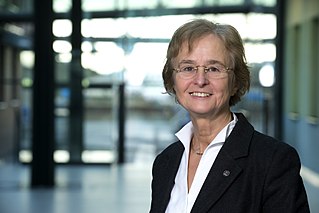
Karin Lochte is a German oceanographer, researcher, and climate change specialist. She was director of German Polar Research Alfred Wegener Institute from 2007 to 2017 as well as chairman of the management committee of Jacobs University Bremen.
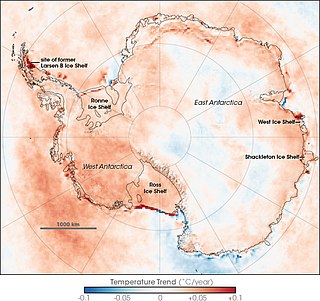
Temperature change due to climate change in Antarctica is not stable over the whole continent. West Antarctica is warming rapidly, while the inland regions are cooled by the winds in Antarctica. Water in the West Antarctic has warmed by 1 °C since year 1955. Further increase in temperature in water and on land will affect the climate, ice mass and life on the continent and have global implications. Present-day greenhouse gas concentrations are higher than ever according to ice cores from Antarctica, which indicates that warming on this continent is not part of a natural cycle and attributable to anthropogenic climate change.
Deborah K. Steinberg is an American Antarctic biological oceanographer who works on interdisciplinary oceanographic research programs. Steinberg's research focuses on the role that zooplankton play in marine food webs and the global carbon cycle, and how these small drifting animals are affected by changes in climate.

Diana Harrison Wall is the founding director of the School of Global Environmental Sustainability, a distinguished biology professor, and senior research scientist at the Natural Resource Ecology Laboratory at Colorado State University. She is an environmental scientist and a soil ecologist and her research has focussed on the Antarctic McMurdo Dry Valleys. Wall investigates ecosystem processes, soil biodiversity and ecosystem services and she is interested in how these are impacted by global change. The Wall Valley was named after her in recognition of her research in the McMurdo Dry Valleys. Wall is a globally recognised leader and speaker on life in Antarctica and climate change.

In-Young Ahn is a South Korean scientist. She is known for being the first South Korean woman to visit Antarctica and the first Asian woman to become an Antarctic station leader. She is a benthic ecologist and is currently working as a principal research scientist for Korea Polar Research Institute.
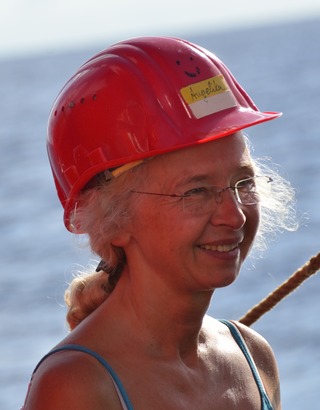
Angelika Brandt is the world leader in Antarctic deep-sea biodiversity and has developed, organised and led several oceanographic expeditions to Antarctica, notably the series of ANDEEP cruises, which have contributed significantly to Antarctica and deep-sea biology. Brandt was the senior scientist of ANDEEP which was devoted entirely to benthic research in the Antarctic abyss.
Carlota Escutia Dotti is a Spanish geologist, best known for her work on the geologic evolution of Antarctica and the global role of the Antarctic ice cap. Escutia is based at the Instituto Andaluz de Ciencias de la Tierra, Universidad de Granada and the High Council for Scientific Research (CSIC).
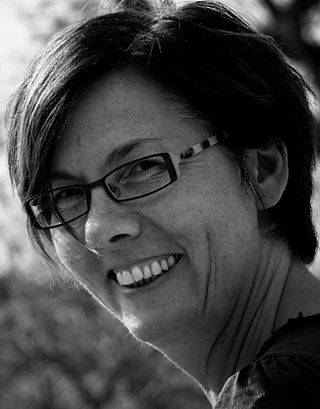
Bettina Meyer is a German Antarctic researcher, best known for her work on the ecology and physiology of invertebrates in the pelagic zone. She is the head of the ecophysiology of pelagic key species working group at the Alfred Wegener Institute for Polar and Marine Research (AWI).

Irene R. Schloss is an Antarctic researcher, best known for her work on plankton biology. She is a researcher at the Argentine Antarctic Institute and was a correspondent researcher of the National Scientific and Technical Research Council of Argentina until July 2017. She became an independent researcher since August 2017 and an associate professor at the University of Quebec.

Cinzia Verde is an Italian researcher in marine biochemistry at the National Research Council (CNR), Institute of Biosciences and BioResources (IBBR).

Julie Michelle Palais is an American polar glaciologist who has made significant contributions to climate change research studying volcanic fallout in ice cores from both Greenland and Antarctica. For many years, starting in 1990, she played a pivotal role working at the National Science Foundation (NSF) as Program Director of the Antarctic Glaciology Program in the Division of Polar Programs, including many trips to both North and South Polar regions. Both the Palais Glacier and Palais Bluff in Antarctica were named in her honor and she has received many further recognitions for her distinguished career.
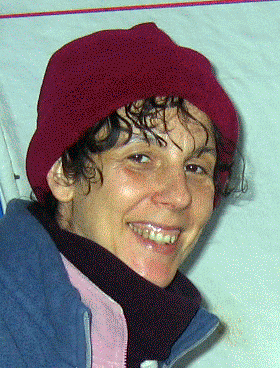
Annick Wilmotte is a Belgian Antarctic researcher, best known for her research on the diversity and ecology of Antarctic cyanobacterial microflora. A genus of Antarctic cyanobacteria, called Wilmottia was named after her in recognition of her work in this field.

Marine ice sheet instability (MISI) describes the potential for ice sheets grounded below sea level to destabilize in a runaway fashion. The mechanism was first proposed in the 1970s by Johannes Weertman and was quickly identified as a means by which even gradual anthropogenic warming could lead to relatively rapid sea level rise. In Antarctica, the West Antarctic Ice Sheet, the Aurora Subglacial Basin, and the Wilkes Basin are each grounded below sea level and are inherently subject to MISI.

Amelia E. Shevenell is an American marine geologist who specializes in high-latitude paleoclimatology and paleoceanography. She is currently a Professor in the College of Marine Science at the University of South Florida. She has made notable contributions to understanding the history of the Antarctic ice sheets and published in high-impact journals and, as a result, was awarded full membership of Sigma Xi. She has a long record of participation in international ocean drilling programs and has served in leadership positions of these organizations. Shevenell served as the elected Geological Oceanography Council Member for The Oceanography Society (2019-2021).

















